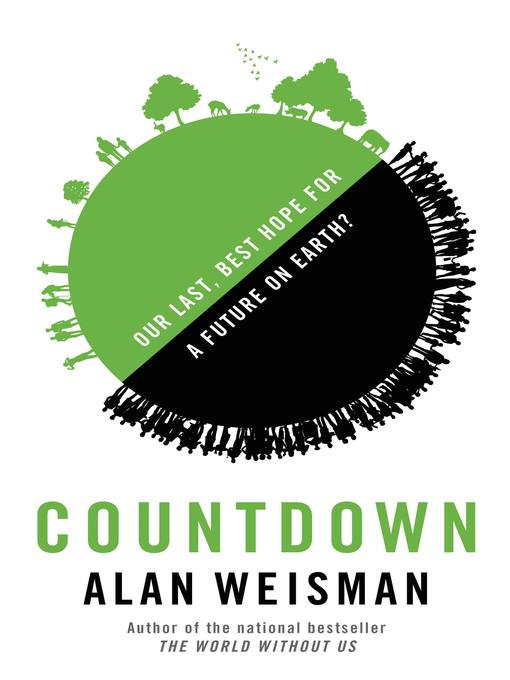
Countdown
Our Last, Best Hope for a Future on Earth?
کتاب های مرتبط
- اطلاعات
- نقد و بررسی
- دیدگاه کاربران
نقد و بررسی

Starred review from May 27, 2013
In this follow-up to The World Without Us, journalist Weisman visits more than 20 countries to explore four urgent questions. How many people can our planet hold? Is it in our own best interest to limit population growth? Which species are essential to our survival? And how can we design a prosperous economy that does not depend on endless growth and consumption? Weisman argues that this will be the century in which we must manage our population, “or nature will do it for us in the form of famine, thirst... crashing ecosystems, and wars over dwindling resources.” To seek answers, he visits some of the planet’s most overcrowded regions, including the Philippines, Niger, and India—with its “archetypal new megalopolis,” Mumbai, swollen beyond comprehension at 21 million. He also visits countries that have slowed their population growth (Iran and Thailand), and those whose populations are dwindling, such as Japan. Weisman interviews Catholic clerics; Buddhist monks; biologists, including Paul Erlich (The Population Bomb); physicists, demographers; and others. He also analyzes the repercussions of China’s one-child policy; the Haber-Bosch fertilization method that led to higher food yields; and the chronic malnourishment afflicting one billion people today. Provocative and sobering, this vividly reported book raises profound concerns about our future.

Starred review from August 1, 2013
Intrepid planetary journalist Weisman put our minds in a whirl with his best-selling The World without Us (2007), a vivid projection of what would happen if humankind suddenly vanished. Here he asks a really tough question: What will happen on the warming earth if our population continues to grow? Aware that population control is a treacherous subject, Weisman boldly traveled to more than 20 diverse countries, from India to Italy to Japan, instigating remarkably candid conversations with religious leaders, scientists, and public-health experts. Spirited descriptions, a firm grasp of complex material, and a bomb defuser's steady precision make for a riveting read as Weisman takes a close look at China's one-child policy and the religious and political imperatives responsible for large Palestinian and ultra-Orthodox Jewish families in Jerusalem in spite of scarce resources. In stricken Niger, he talks with two brothers, both imams. One says man cannot hold back doomsday; the other actively supports the use of contraception. In Uganda, he discovers the connection between family planning, wildlife protection, and economy-boosting ecotourism. Weisman's cogent and forthright global inquiry, a major work, delineates how education, women's equality, and family planning can curb poverty, thirst, hunger, and environmental destruction. Rigorous and provoking, Countdown will generate numerous media appearances for Weisman and spur many a debate.(Reprinted with permission of Booklist, copyright 2013, American Library Association.)

April 15, 2013
In his best-selling The World Without Us, Weisman contemplated an Earth without humanity. In this follow-up, he considers the impact of the staggering number of people on this planet and how we can slow population growth and heal the damage already wrought. With a 12-city tour.
Copyright 2013 Library Journal, LLC Used with permission.

September 1, 2013
Journalist Weisman (The World Without Us) here highlights the critical connection between human population growth and ecological degradation, a subject that's not on the table at environmental summit meetings. The author takes up the issue popularized by Paul Ehrlich's The Population Bomb. Human proliferation (the global population presently numbers seven billion, plus 220,000 more births per day) is a major factor in resource depletion, pollution, and climate change. Even "green revolution" hybrid crops have limitations, and climate change is beginning to effect yields, so feeding a projected peak population of ten billion sustainably looks impossible. Weisman traveled widely while researching this book, investigating the religious, cultural, and political influences that produce large families and how attitudes about family size might be changing. He concludes that education and empowerment of women, along with access to reliable contraception, is beginning to limit family size and slow the global birthrate. The process is uneven: the transition has already happened in some nations, particularly as people continue to migrate from farms to cities. VERDICT The issue of human population control needs to be part of environmental collections, as it is key to the future quality of the biosphere and human lives. Recommended. [See Prepub Alert, 3/18/13.]--David R. Conn, formerly with Surrey Libs., BC
Copyright 2013 Library Journal, LLC Used with permission.

























دیدگاه کاربران